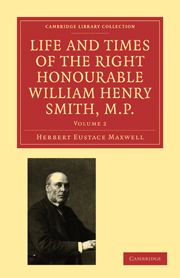Book contents
- Frontmatter
- Contents
- ILLUSTRATIONS TO THE SECOND VOLUME
- CHAPTER I 1878–1880
- CHAPTER II 1880–1881
- CHAPTER III 1882–1884
- CHAPTER IV 1880–1885
- CHAPTER V 1871–1891
- CHAPTER VI 1885
- CHAPTER VII 1886–1887
- CHAPTER VIII 1887
- CHAPTER IX 1888
- CHAPTER X 1889
- CHAPTER XI 1890
- CHAPTER XII 1891
- CHAPTER XIII 1891
- APPENDIX
- INDEX
- Plate section
CHAPTER XI - 1890
Published online by Cambridge University Press: 29 August 2010
- Frontmatter
- Contents
- ILLUSTRATIONS TO THE SECOND VOLUME
- CHAPTER I 1878–1880
- CHAPTER II 1880–1881
- CHAPTER III 1882–1884
- CHAPTER IV 1880–1885
- CHAPTER V 1871–1891
- CHAPTER VI 1885
- CHAPTER VII 1886–1887
- CHAPTER VIII 1887
- CHAPTER IX 1888
- CHAPTER X 1889
- CHAPTER XI 1890
- CHAPTER XII 1891
- CHAPTER XIII 1891
- APPENDIX
- INDEX
- Plate section
Summary
The prospect before Ministers at the opening of 1890 was dark and lowering. The Parnell Commission had not yet reported; but inasmuch as their proceedings had, from the first, worn the appearance of a State trial, in which the Irish members were arraigned at the instance of the Government, the exposure of Pigott's villany, and the enforced abandonment of that part of the charge which depended on the genuineness of letters alleged to have been written by Parnell, had told with tremendous effect against the Unionist party.
A statement went the round of the papers to the effect that, as a consequence of the collapse of the case of the forged letters, Smith intended to resign his office. To a correspondent who wrote to ask the truth about this story, he replied through his secretary that he would have no peace if he were to contradict all the silly statements about him.
Parliament having met on February 11, Sir William Harcourt, before the debate on the Queen's Speech was begun, raised the question of privilege, of which, he maintained, a breach had been committed against the House by the ‘Times’ in the matter of the charges against the Irish members, and the diminished majority by which his motion was rejected—58—testified to the loss of prestige incurred by the Government as a consequence of their supposed connection with the case.
- Type
- Chapter
- Information
- Life and Times of the Right Honourable William Henry Smith, M.P , pp. 264 - 294Publisher: Cambridge University PressPrint publication year: 2010First published in: 1893

